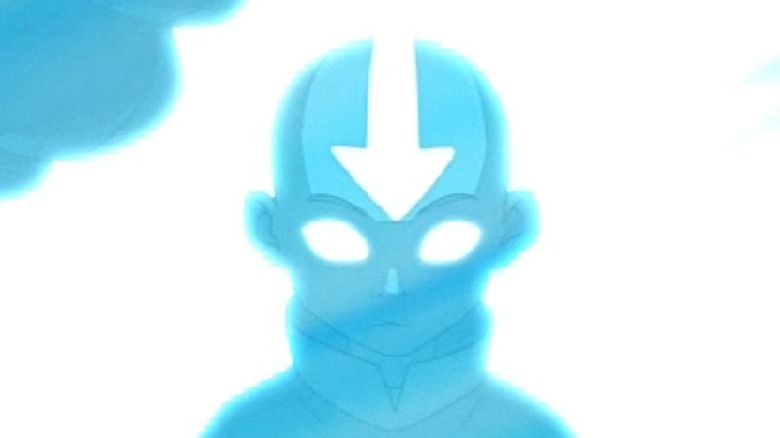The Real Reason Aang Died So Early In The Legend Of Korra
In combining earth, water, fire, and air, Michael Dante DiMartino and Bryan Konietzko conjured up one of the most popular and culturally significant animated shows of all time: "Avatar: The Last Airbender." The program kicked off in the winter of 2005, welcoming viewers into a world divided amongst four nations that represent the four elements. This is where the last remaining Air Nomad, Aang (Zach Tyler Eisen), would go on a journey to master all of the elements and put a stop to the tyrannical Fire Kingdom with his faithful companions at his side.
This tale encompassed a total of three seasons and 61 episodes across a span of roughly three years, but fans of "The Last Airbender" weren't content to let the credits roll so soon. The strong devotion of the fanbase in large part led to the premiere of a sequel series in 2012 known as "The Legend of Korra," which jumped ahead 70 years in the ever-expanding "Last Airbender" timeline. It put the spotlight on a native of the Southern Water Tribe named Korra (Janet Varney), whose destiny is to follow in Aang's footsteps as the next Avatar.
Given that several decades have elapsed since the events of "The Last Airbender," it should come as no surprise that Aang didn't survive to take part in "The Legend of Korra" as a living, breathing person. Although, he strangely wound up dying of natural causes much sooner than even the average person would. Here's what led to Aang's mysteriously premature demise.
Aang's time on ice shortened his lifespan
As is explained throughout "Avatar: The Last Airbender," Aang and his trusty flying bison, Appa, were frozen in ice when the young Airbender was merely 12 years old. They got caught in a severe storm and nearly drowned in a body of water, thankfully surviving via an air pocket of the Avatar Spirit's creation. As a result, the two remained in cryostasis for an entire century, eventually being freed by the sibling duo of Sokka (Jack DeSena) and Katara (Mae Whitman) from the Southern Water Tribe.
Despite 100 years passing, both Aang and Appa hadn't aged a day upon being released from their icy prison. Even as "The Last Airbender" went on, they showed no signs of advanced physical aging, but in reality, they were both on borrowed time. Specifically, in Aang's case, his time on ice took a significant toll on his life energy, meaning that even though he didn't look it, he soon began to feel his true triple-digit age. By the time he hit 166, his body couldn't take it anymore, and he passed on — only living 66 years with his friends and family (via The Gamer).
Aang's story is one comprised of equal parts triumph and misery. Sure, he carried on the Avatar mantle and became one of history's most important people, but he never had the chance to live life on his own terms. If nothing else, at least his early death paved the way for Korra to rise and carry on his legacy in a new era.

